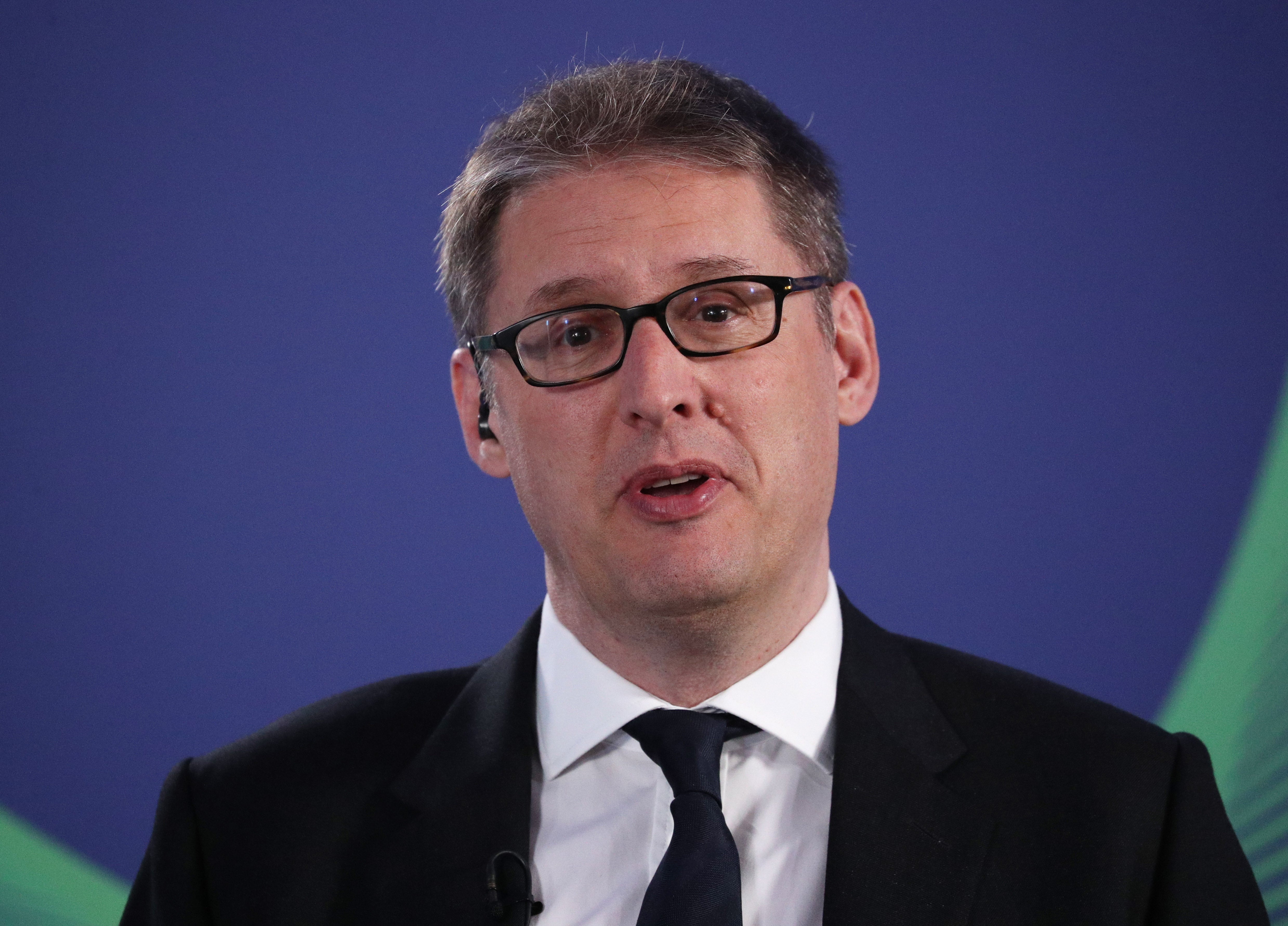Rishi Sunak’s government ‘going backwards’ on green growth, CBI chief warns
Business group warns of slump in investment and productivity as UK mired in ‘stagflation’

The head of Britain’s biggest business organisation has warned that the government is “going backwards” on the green growth agenda which provides the best opportunity to lift the country out of recession over the coming years.
Tony Danker, director-general of the Confederation of British Industry (CBI), said that businesses were “confused and disappointed” over the failure of Rishi Sunak’s government to foster green growth measures such as lifting the ban on onshore wind farms in England – a move that has divided the party – and making the City of London a global centre for sustainable finance.
Mr Danker’s warning comes as the group released a sombre analysis of the outlook for the UK’s economy, sharply cutting forecasts for growth and predicting that productivity and business investment will remain below pre-Covid trends until the end of 2024.
With a GDP contraction of 0.4 per cent forecast for next year and growth of just 1.6 per cent the next, the CBI predicted that UK national income at the end of 2024 will be 8 per cent below its pre-pandemic trend and a remarkable 27 per cent below what it would have reached if the growth seen before the 2008 financial crash had continued.
In a biting assessment of Mr Sunak’s economic position, Mr Danker said the CBI believes the UK is already in recession and suffering “stagflation” – a combination of soaring inflation and falling GDP. It risks a “lost decade of growth” unless ministers take action over the next two or three months to tackle persistent weaknesses in investment and productivity.
Measures to restore stability in Jeremy Hunt’s autumn statement were only “step one” towards shifting the economy off its downward trajectory, he said. Ministers must now use “all levers at their disposal” to foster growth by addressing shortages of workers and skills and reform to planning rules and regulations.
“The country does not have a plan for growth,” said Mr Danker. “There isn’t a plan yet on what we do about economic inactivity. There isn’t really a plan yet on what we do on childcare. There isn’t a plan on what we do to grow workforce skills. And there isn’t a plan – there’s not even a shortage occupation list –on what we do on immigration.”
He said business concerns were most acute in the low-carbon sector, which was identified by Boris Johnson as a key growth area but has taken a back seat since this summer’s leadership contest, when Mr Sunak and Liz Truss competed to be most disparaging about onshore wind turbines and solar panels on farmland.
“The big policy lever that’s missing is around green growth,” said Mr Danker. “That has taken a backward step since Boris Johnson left because I think he was the personal champion in the cabinet for that.”
There was “genuine and widespread concern” in the business community that the government is “going backwards on green growth”, said the CBI chief.
“Given that it is by far and away the largest economic growth prize for Britain, the government is strangely silent and reticent on all the levers for green growth, across the clean energy opportunity, decarbonisation of other sectors, the role of the City of London to genuinely be the world capital for sustainable finance.
“In crude terms, most businesses think the government is going backwards on green, having spent the last five years going significantly forwards on green. They are confused and disappointed.”
The CBI forecast of a 0.4 per cent contraction in GDP during 2023 was sharply downgraded from June, when the business group predicted an uplift of 1 per cent over the year.
Its economic forecast predicted a year-long fall in consumer spending as household incomes are squeezed. But it foresaw a return to growth of 1.6 per cent in 2024.
Productivity was forecast to remain weak, at 2 per cent below the pre-pandemic trend at the end of 2024. And business investment was predicted to be 9 per cent below its pre-Covid levels – equivalent to around £5bn a year.
While inflation has probably peaked at 11.1 per cent in October, the CBI expects it to fall only gradually over the coming year, reaching 3.9 per cent – almost double the Bank of England’s 2 per cent target – by the end of 2023.
Mr Danker called on ministers to introduce a permanent full allowances regime, which he said would unlock an extra £50bn in capital investment per year by the end of the decade – the equivalent of 0.25 per cent on GDP.
He said: “Britain is in stagflation – with rocketing inflation, negative growth, falling productivity and business investment.
“Firms see potential growth opportunities but a lack of ‘reasons to believe’ in the face of headwinds are causing them to pause investing in 2023.
“Government can change this. Their action or inaction to support growth and investment will be a key determinant of whether recession is shallow or deep.”
Mr Danker’s concerns were echoed by green energy industry body Renewable UK, whose CEO Dan McGrail told The Independent the CBI was “right to highlight the huge opportunity for further investment in green growth in the UK”.
“We need to attract £175bn in private investment in wind power alone over the course of this decade to stay on track to meet the government’s climate change targets,” said Mr McGrail.
“Clear policies which support the development of onshore wind in England, bringing it into line with other parts of the UK, would help us to take us a step forward towards those goals, as well as creating jobs and generating more clean electricity from one of our cheapest power sources, reducing bills for consumers.”







Join our commenting forum
Join thought-provoking conversations, follow other Independent readers and see their replies
0Comments